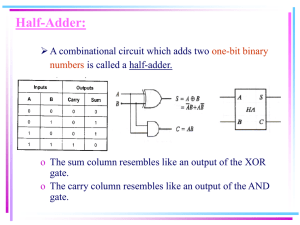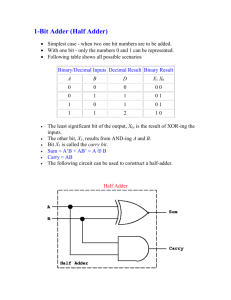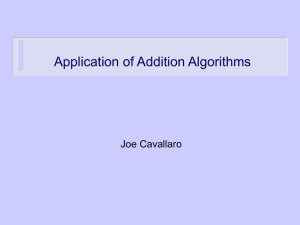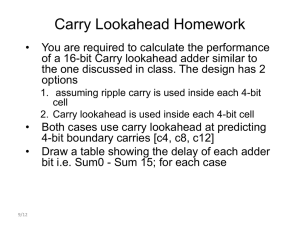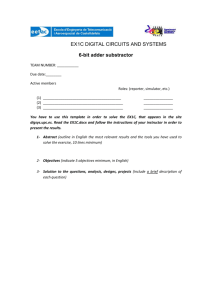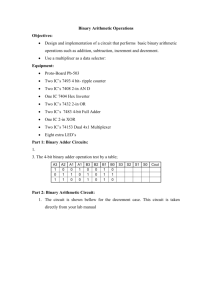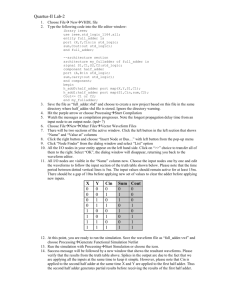Computer Arithmetic
advertisement
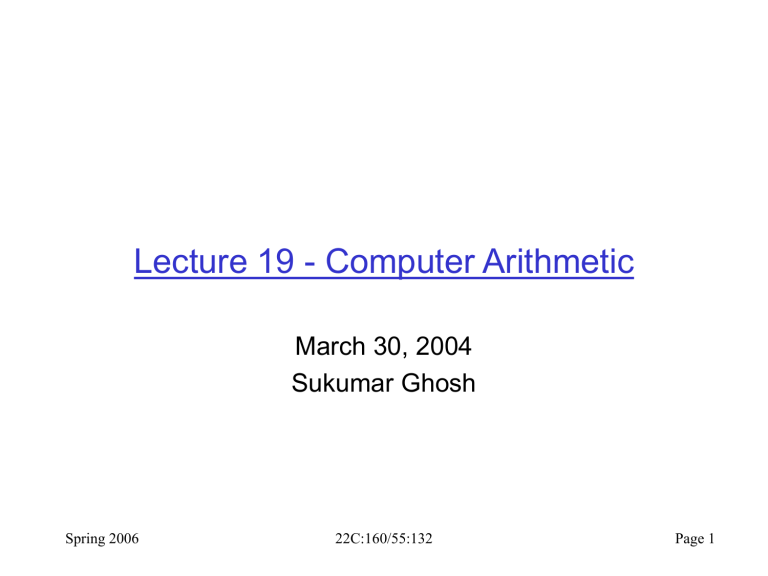
Lecture 19 - Computer Arithmetic March 30, 2004 Sukumar Ghosh Spring 2006 22C:160/55:132 Page 1 Carry-ripple Adder • Each cell: ri = ai XOR bi XOR cin cout = aicin + aibi + bicin = cin(ai + bi) + aibi • 4-bit adder: “Full adder cell” Spring 2006 22C:160/55:132 Page 2 Adders (cont.) Ripple Adder c7 c6 c5 c4 c3 c2 b0 a0 c0 FA s7 c1 s6 s0 Ripple adder is inherently slow because, in general s7 must wait for c7 which must wait for c6 … T a n, Cost a n How do we make it faster, perhaps with more cost? Spring 2006 22C:160/55:132 Page 3 Carry Select Adder b7 a7 b6 a6 b5 a5 b4 a4 b3 a3 b2 a2 b1 a1 b0 a0 c0 FA c8 0 b7 a7 b6 a6 b5 a5 0 1 b4 a4 s3 s2 s1 s0 1 FA 1 0 s7 1 0 s6 1 0 s5 1 0 s4 T = Tripple_adder / 2 + TMUX Spring 2006 22C:160/55:132 Page 4 Carry Select Adder • Extending Carry-select to multiple blocks b15-b12 a15-a12 b11-b8 a11-a8 b7-b4 a7-a4 b3-b0 4-bit Adder cout 1 0 4-bit Adder 1 0 4-bit Adder 1 0 1 0 1 0 1 0 4-bit Adder 1 0 4-bit Adder 1 0 1 0 1 0 a3-a0 1 0 4-bit Adder 4-bit Adder 1 0 1 0 1 0 1 0 • What is the optimal # of blocks and # of bits/block? – If # blocks too large delay dominated by total mux delay – If # blocks too small delay dominated by adder delay N stages of Spring 2006 N bits T a sqrt(N), Cost 2*ripple + muxes 22C:160/55:132 Page 5 cin Carry Select Adder b15-b12 a15-a12 b11-b8 a11-a8 b7-b4 a7-a4 b3-b0 4-bit Adder cout 1 0 4-bit Adder 1 0 4-bit Adder 1 0 1 0 1 0 1 0 4-bit Adder 1 0 4-bit Adder 1 0 1 0 1 0 a3-a0 1 0 4-bit Adder 4-bit Adder 1 0 1 0 1 0 cin 1 0 • Ttotal = sqrt(N) TFA – assuming TFA = TMUX • For ripple adder Ttotal = N TFA • Is sqrt(N) really the optimum? – From right to left increase size of each block to better match delays – Ex: 64-bit adder, use block sizes [13 12 11 10 9 8 7] • How about recursively defined carry select? Spring 2006 22C:160/55:132 Page 6 Carry Look-ahead Adders • For n-bit addition best we can achieve is delay a log(n) • How do we arrange this? (think trees) • First, reformulate basic adder stage: carry “propagate” pi = ai bi a b ci ci+1 s 000 0 0 001 0 1 010 0 1 011 1 0 100 0 1 101 1 0 110 1 0 111 1 1 Spring 2006 carry “generate” gi = ai bi ci+1 = gi + pici si = pi ci 22C:160/55:132 Page 7 Carry Look-ahead Adders • Ripple adder using p and g signals: c0 a0 b0 p0 g0 s 0 = p0 c 0 c1 = g0 + p0c0 s0 a1 b1 p1 g1 s 0 = p1 c 1 c2 = g1 + p1c1 s1 a2 b2 p2 g2 s 2 = p2 c 2 c3 = g2 + p2c2 s2 a3 b3 p3 g3 s 3 = p3 c 3 c4 = g3 + p3c3 s3 c4 • So far, no advantage over ripple adder: T a N Spring 2006 22C:160/55:132 Page 8 Carry Look-ahead Adders • Expand carries: c0 c1 = g0 + p0 c0 c2 = g1 + p1c1 = g1 + p1g0 + p1p0c0 c3 = g2 + p2c2 = g2 + p2g1 + p1p2g0 + p2p1p0c0 c4 = g3 + p3c3 = g3 + p3g2 + p3p2g1 + . . . . . . • Why not implement these equations directly to avoid ripple delay? – Lots of gates. Redundancies (full tree for each). – Gate with high # of inputs. • Let’s reorganize the equations. Spring 2006 22C:160/55:132 Page 9 Carry Look-ahead Adders • “Group” propagate and generate signals: pi gi pi+1 gi+1 pi+k gi+k cin P = pi pi+1 … pi+k G = gi+k + pi+kgi+k-1 + … + (pi+1pi+2 … pi+k)gi cout • P true if the group as a whole propagates a carry to cout • G true if the group as a whole generates a carry Cout = G + PCin • Group P and G can be generated hierarchically. Spring 2006 22C:160/55:132 Page 10 c0 a0 b0 a1 b1 a2 b2 Carry Look-ahead Adders 9-bit Example of hierarchically generated P and G signals: Pa a Ga P = PaPbPc c3 = Ga + Pac0 a3 b3 a4 b4 a5 b5 Pb b Gb c6 = Gb + Pbc3 a6 b6 a7 b7 a8 b8 Spring 2006 Pc G = Gc + PcGb + PbPcGa c Gc c9 = G + Pc0 22C:160/55:132 Page 11 c0 c0 p0 s0 p1 s1 p1 s2 p3 s3 p4 s4 p5 s5 p6 s6 p7 s7 Spring 2006 P8=p0p1 g0 c1= g0+p0c0 g1 c2 G8=g1+p1g0 c2=G8+P8c0 P9=p2p3 g2 8-bit Carry Look-ahead Adder with 2-input gates. Pc=P8P9 Gc=G9+P9G8 c4=Gc+Pcc0 c3= g2+p2c2 G9=g3+p3g2 g3 Ge=Gd+PdGc c4 c4 Pa=p4p5 Pe=PcPd c8=Ge+Pec0 g4 c5= g4+p4c4 g5 Ga=g5+p5g4 Pd=PaPb c6=Ga+Pac4 c6 Pb=p6p7 Gd=Gb+PbGa g6 c7= g6+p6c6 g7 Gb=g7+p7g6 c8 22C:160/55:132 Page 12 Multiplication A = a7 a6 a5 a4 a3 a2 a1 B = b7 b6 b5 b4 b3 b2 b1 A x B = 26.b7.A + 25.b7.A + 24.b7.A + 23.b7.A + … + b7.A Use Carry Save Adders What is CSA? Spring 2006 22C:160/55:132 Page 13 Carry Save Adder 1 1 0 0 1 1 0 1 1 1 0 1 0 1 1 0 0 1 Sum 1 1 0 1 1 1 0 1 1 0 0 1 Carry computed in parallel 1 1 0 1 0 0 1 Ordinary addition CSA Spring 2006 22C:160/55:132 Page 14
